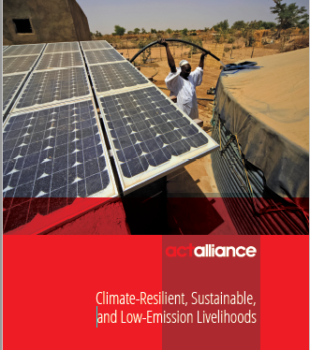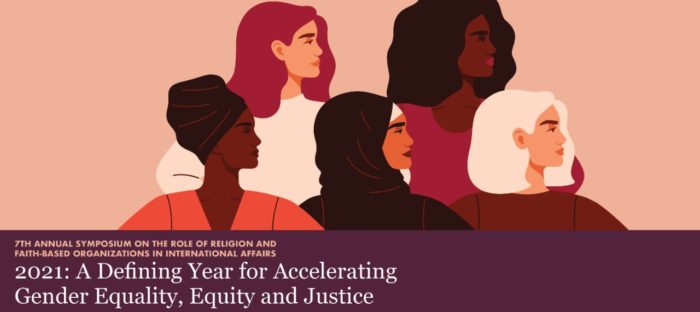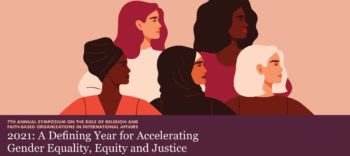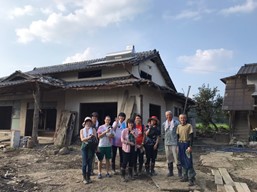Regional Newsletter Asia Pacific 2-2021
Bangladesh Forum: Event Report on National level Experience Sharing_20210519
Regional Newsletter Asia Pacific 2-2021
Bangladesh Forum: Event Report on National level Experience Sharing_20210519

LWF Training on Mainstreaming community based psychosocial support, January 2020
Shakeb Nabi, Forum Convenor, ICCO Cooperation Country Director
How often do you meet within the forum?
The ACT forum in Bangladesh is a robust and dynamic forum with very diverse sets of members. We have a combination of both the national and international organizations coming together for a common cause. Bangladesh is one of the countries highly prone to disasters because of the impact of climate change. In order to keep a watch on the situation and engage in joint planning and response we meet on a very regular basis. On an average it would be around once a month. The ACT partners also have various layers which interact with each other. The head of the organization would meet once in two months focusing mostly on strategic issues and also meet if there is some emergency. The operational team comprising of the project managers meet more often on the ground. Apart from that, the communications team of various ACT forum agencies also work closely with each other around knowledge management and joint branding and visibility.
Where is the focus of joint activities within the forum?
The forum is engaged collectively in various joint activities right from monitoring the situation on the ground in terms of any impending disaster. We also have a collective disaster response and management plan which focuses on the hazards, vulnerabilities and capacities of the ACT Alliance team members collectively. Apart from that, in the event of any disaster, we jointly do the needs assessment, design and program implementation.
As ACT Alliance, we are also engaged in joint advocacy at the national and international level. This is mostly around disaster risk reduction and climate change. Along with other faith-based agencies, we are as well engaged in promoting the role of faith actors in development. The joint activities moreover focus on knowledge co-creation and dissemination with joint branding and visibility.
Why do you think coordination or work together is important?
Coordination within ACT Alliance members and between ACT Alliance members and other development actors helps us to achieve the development outcome in an effective and efficient way. We coordinate to come to a common understanding on various issues. We coordinate to optimize the use of resources and we also coordinate to ensure that the civil society has a larger voice in various discourses, especially when it comes to advocating for the rights of the most marginalized and the vulnerable. Coordination and collective efforts also brings in larger visibility to the ACT Forum.
What is a project or programme that has benefitted from the Forum structure?
One of the projects, which was around COVID response focusing on safety and security of the community and their economic recovery, has been a great example for working together and learning from each other. The nature and the severity of the pandemic and to add to it, an unprecedented event in the last 100 years in our region posed a great challenge to all of us in terms of planning and ensuring that the project is implemented as per the plan. The crisis also demanded a large scale and urgent action. Since most of our team members are from Bangladesh, they had not witnessed or responded to this kind of a crisis in the past. The ACT forum brings in agencies from different parts of the world to respond to any crisis collectively. Our first agenda was to learn from people who have worked in a similar context in different parts of the world and responded to a health pandemic before. After few months, we feel that our humanitarian team has sufficient skills to respond to a large health crisis also. As ACT forum we continue to invest in the team so that our team if needed can also be used as a resource in different countries.
What is something that you are excited to see the Forum doing this year?
The ACT Alliance forum is always in a lookout for collective actions. Recently we organized a round table with other faith-based agencies on the contribution of faith agencies towards achieving SDGs and ways to strengthen it further. The members of the Alliance are fully committed to “The Charter for Change” and we are excited to be working further on that to ensure that the humanitarian assistance is as close as possible to the community. It would be very interesting to see how the Localization agenda brings the INGOs and local NGOs closer to each other and complement each other for effective and efficient humanitarian response. We are also together adapting to the New Normal by embracing various digital technologies for transformational change.
How do you collaborate with the National Council of Churches in your country?
The National Council of Churches is one of our key partners in the strategic planning processes. Their development wing “Shalom” is also one of our key partners implementing the program on the ground.
In what sense do you benefit from the collaboration as an organization or as an individual?
Coordination is a tool and a process for us to give larger impetus to an advocacy work by joining in forces with the like-minded agencies. We all benefit collectively as we present a larger voice to other development actors including the government. There have been instances, while organizing a lesson learnt event or an advocacy event wherein different ACT members have come together and contributed collectively to its success.
How do you communicate throughout the year?
The ACT forum members are closely connected with each other on a regular basis. Most of the communications on a regular basis is done online. There are various small teams within the ACT Alliance forum, on comprising of the head of the respective organization. Then we have a team comprising of the people working collectively on the ground. The team on the ground if they are working in the same geographical area meet very frequently to support each other at the operations level. There have also been instances when more than one ACT Forum partner has shared the office space. The head of the organization meets once in two months and as and when required.
What challenges have you encountered?
The ACT forum is being seen as a collective which is making significant changes in the lives and livelihoods of the most vulnerable and the marginalized communities. There has been a larger recognition of our efforts by various development actors including the government and the donors. We also see a willingness by non-ACT members to collaborate for a larger cause. In spite of its recognition as a key development partner, it has its own challenges. One of the challenges, linked to the global trend is around “Shrinking Space for the Civil Society”. Due to various factors like diminishing commitment of resources for the South and South Asia region, legislation of the government enforcing new regulatory framework with enhanced bureaucracy and the entrance of the private sector in the same space thus making the ecosystem less favorable to the civil societies.

Workshop on Food Security and Livelihood Support, November 2020
Juliate K. Malakar, Christian Commission for Development in Bangladesh (CCDB), Executive Director
Where do you see the benefits/added value of participating in the forum?
ACT Bangladesh Forum of Bangladesh is a very vibrant forum. All ACT members meet together on a regular basis, share contextual experiences and support each other to access resources, to build capacity and to implement emergency and recovery programs together. ACT Alliance members around the globe also are very cooperative and generous to support the work we do in this south as ACT Bangladesh Forum. Previously there have been several national forum members active. But the national forum members were unable to pay the subscription fees, as a result they were suspended as ACT forum members. Right at this moment, CCDB is the only national forum member active. The rest of the forum members are from International development agencies. Because of less participation of national form members, ACT forum Bangladesh has declined its strength from the perspective of localization. At the same time, it is necessary to mention that, the International Agency forum members are very cooperative and supportive towards all members at this forum. Indeed it would have been a better platform if ACT forum Bangladesh could bring back all ex-national forum members under Bangladesh ACT forum following the changed membership policy.
The benefits of participating the forum:
What are the topics or issues which are most important for you within the forum?
Shahid Kamal, HEKS/EPER Regional Humanitarian Aid Coordinator Asia
Where do you see the benefits resp. the added value of participating in the Bangladesh forum?
I consider the ACT Forum is a “strength” of the member organizations. We can share resources in developing policies/manual/guidelines. Capacity building is also another area where the forum member can join hands. We can get updates/advices from others. Avoiding duplications also possible when we regularly participate in the forum meetings and share our project plans. For advocacy, this forum can play a vital role.
What are the topics or issues which are most important for you within the forum?
I think there is room for further strengthening the joint work by forming a consortia for acquisition. We can discuss joint collaboration/resource mobilization. Emergency response plan is also a topic to discuss in the forum.

EPRP orientation at Cox’s Bazar
 ACT Alliance is proud to launch it’s newest publication Climate-Resilient, Sustainable, and Low-Emission Livelihoods.
ACT Alliance is proud to launch it’s newest publication Climate-Resilient, Sustainable, and Low-Emission Livelihoods.
In a period of climate emergency, a more efficient means to secure survival and sustainable development is to find co-beneficial means to address climate-related issues with efficiency. Efficiency is needed because of the deep concern of the impact of the fast-evolving climate hazards on peoples, ecosystems, assets, and overall development. In the past, adaptation options have resulted in trade-offs or maladaptations that had adverse impacts, such as increasing greenhouse gas emissions, increasing gender and social inequality, undermining health conditions, and encroaching on natural ecosystems. Mitigation efforts may also create trade-offs with adaptation objectives, such as when priorities over bioenergy crops and forest regeneration compete with land needs for agricultural adaptation. This may undermine food security, livelihoods, and ecosystem functions and services.
This series of case studies explores community-based and other livelihood initiatives undertaken by ACT Alliance members.
Philippines
The NCCP-ACT Alliance Emergency Team in December 2020 reached 4,546 families affected by super-typhoon Goni and Vamco residing in Albay, Camarines Sur, and Rizal. They received food packs and hygiene/sanitation kits through the support of ACT Alliance members, individual and group donors. Early recovery response is ongoing, targeting communities for cash assistance, repair of shelters and water systems.
Amid continued violence in the country, the NCCP organized an “International Ecumenical Convocation on the Defense of Human Rights in the Philippines” gathering various international church groups and human rights organizations, with ACT Alliance as one of the sponsors. The church leaders and international ecumenical partners affirmed support for Filipinos who are enduring a ‘deteriorating situation of civil liberties and human rights’ through a ‘Unity Statement for the Protection and Promotion of Human Rights in the Philippines’. The NCCP and its member churches continue to engage in lobbying work, campaign activities and public advocacy to uphold dignity of life.

Full Symposium:
History of the Symposium and 2021 Theme clip:
Sponsoring agencies video:
NOTE: We will be using slido.com to allow participants to ask questions of the panelists throughout the sessions. More information will be shared during the event.


ACT Resilience Award 2020
Every year the ACT Resilience Award wants to prompt members to showcase their best-practices and promote cross-region learning on innovative resilience, disaster risk reduction (DRR) and climate change adaptation (CCA) projects. This year the ACT Resilience Award is linked to the Global Platform on Disaster Risk Reduction (GPDRR) (location to be defined) to be held in 2021.
The GPDRR will review the progress in the implementation of the Sendai Framework on DRR which was adopted in March 2015 in Japan. It is critical for ACT Alliance to be present in this forum. By submitting your good practices you will help the ACT Alliance to position and advocate for the unique role of Faith Based Organisations (FBOs) in promoting resilience and local-led DRR work.
The winning organization will be invited to participate in the Global Platform on DRR. Together we will brainstorm on how to best present the winning project within that context. The selected project will be announced and published on the ACT Alliance website, and, if possible, in all publication materials used during the GPDRR.
ACT Alliance will call for applications in December 2020. More information about this award and its application will be announced in November 2020 by the ACT Alliance Global CoP on DRR and CCA.
Multi stakeholders’ dialogues for more inclusive and ambitious climate policy and action in Asia-Pacific
ACT Alliance aims to bring together key stakeholders in order to chart a way forward for inclusive, ambitious and sustainable climate change policies and actions. Relevant stakeholders will convene and address the current challenges and stalemate in climate policy and action in Asia-Pacific.
By the 1st week of November 2020, ACT Alliance and the Asia Climate Change Consortium (ACCC) plan to organize dialogues in India, Bangladesh, Nepal, The Philippines, Myanmar, Indonesia, Japan, Taiwan, and in the Pacific. The best practices on the sustainable, inclusive, and ambition climate policy and action from the national and regional dialogues will be shared and disseminated to the alliance members in 2021 an “idea book” publication.
If you are interested in being art of it, please contact James Munpa at James.munpa@actalliance.org.
ACT Communications Policy
The Communications Policy in general emphasizes that the ACT Secretariat relies on its members and forums to be sources and mediums of information sharing in communities. The update focuses on bringing the policy into line with the Global Strategy, with additional policies passed since it was last updated, including Child Safeguarding, Social Media, and others, as well as reflecting ACT’s commitment to Quality and Accountability through its CHS certification and the global legal realities of legislation like GDPR which affect communications work. It confirms ACT’s commitment to a localisation sustainable agenda, to a people-centred alliance and the humanitarian development nexus. In its communication work, the ACT Alliance seeks to raise up the voices of these communities accordingly.
Concerning the target audiences, the new policy focuses on ACT members’ staff and volunteers, church leaders and other key stakeholders. It specifies principles of communications at key events just as well as ethics and standards concerning pictures used for media work, informed and implied consent and the sign-off process. Members are further encouraged to assist in translation of ACT material that is of particular concern to them and their audiences.
ACT Branding Policy
The second communications-related policy that was updated is the Branding Policy.
Three chapters have been added to the latter: about the use of the word “Act” in member names, about branding in Advocacy contexts and a chapter offering further branding advice. In addition, a branding guide entitled “Leaving No one Behind” accompanies the Branding Policy and contains more technical information about ACT’s branding.
Of the 129 specialists following the webinar “Understanding and Handling Misinformation in the COVID-19 context”, 81 were from Asia, most of them joining in order to learn good practices around handling misinformation.
The 213 practitioners joining “New Approaches to Monitor Remote Programming during COVID-19” were asked how their monitoring needs changed as a result of COVID-19. While measuring predicted results is still a top priority (often for accountability purposes), understanding negative/unanticipated impacts on communities and questioning what else can be done to support communities are more important during the pandemic than during normal times. There are however, some things that have not changed: the need for basic information about project and programme delivery, donor requirements for accountability data about programmes and organisational capacity for programming and M&E. The conclusion was that “we must work with what we have” in terms of capacities, resources, relationships and structures, as the pandemic has not given the global aid community the time to prepare and develop ideal strategies to combat the situation.
For upcoming webinars: https://communityworldservice.asia/training-calendar/


While typhoons, storms, and heavy flooding have hit Japan very hard in recent years, another record-breaking heavy rain hit the prefectures of Kumamoto and Kagoshima in the southern Kyushu early July 2020 in the middle of the East Asian rainy season. It was officially named as “Heavy rain of July Reiwa 2” by the Japan Meteorological Agency. As a result of flooding and landslides, 65 people were confirmed dead and two are still missing as of 24 September. Over 6000 houses were fully or partly destroyed and nearly 3000 houses were flooded.
ACT Japan Forum secretariat immediately contacted colleagues of YWCA Kumamoto to confirm their safety and intention of emergency response. As the local government authorities in the affected areas have restricted the entries of aid agencies and volunteers from other prefectures because of the COVID-19 situation this year, we decided to provide financial and logistic support the YWCA Kumamoto’s emergency response.
It’s been only four years since Kumamoto had a big earthquake of magnitude 7.0. Because of their previous experience of disaster response and their local CSO-network, their team immediately made visits to evacuation centers, an inundated hospital and migrant families in HItoyoshi City to deliver food item, sanitary supplies and commodities. Furthermore, they started visiting the most severely affected agricultural area, Ogaki Community in Hitoyoshi City to help inundated households with cleaning and relocating. As three months have passed since the disaster, the assistance has now shifted to their recovery phase. The youth team of YWCA Kumamoto assists the affected local rice farmers with their farm work and selling their rice. Their exchange and assistance will be continued, which would help the affected community in speeding up their recovery.
Pictures: Japan Forum